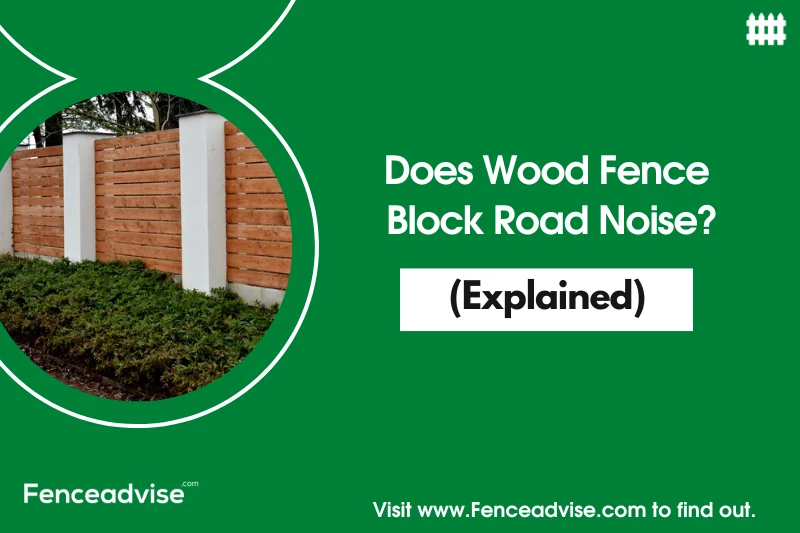We include products we think are useful for our readers. If you buy through links on this page, we may earn a small commission. Read our affiliate disclaimer here.
A wooden fence, a solid barrier can block sound from the road and the immediate surroundings. People weren’t oblivious to the rising trend of loud surroundings and were starting to take action as early as 1971, when lawmakers from the state of Illinois passed a law that stated that no machines built after January 1, 1972, whose noise levels exceeded 94 dB at a distance of 50 ft could be sold.
After January 1980, the maximum permissible noise level was 80 dB. Noise generated can affect the physiological and psychological state of the body by inducing stress.
If you are looking for a way to dampen the noise surrounding your house then a wooden fence is a solution to your problem.
Talk to a Fence Contractor Near You
How Does A Wooden Fence Block Noise?
Wooden fences block the sound waves coming towards it by reflecting off the sound waves that were traveling towards it or by absorbing the energy from the sound wave.
As the wave hits the wood, a portion of it is reflected back into the air just like how talking in the room will cause sound to bounce off the walls, while a portion of it does go through the wood.
Although sound travels faster in solid objects, this does not mean that the amplitude or strength of the sound increases. Energy from the sound waves will be transferred to the particles of the wood causing it to vibrate, and thus once the sound wave exits the wood, it now is less loud than when it entered.
How Much Noise Does Wooden Fence Blocks?
A solid wooden fence of 8ft reduces the noise by 6-10 decibels, with an additional 1.5 decibels reducible per meter added to the height of the wooden fence.
This is because the sound is emitted in various directions from the source and so adding to the height of the fence can further block the sound waves traveling higher.
The value is also dependent on the thickness of the wood used as using thicker and denser wood would decrease the noise that would get through because more energy from the sound waves will be transferred to the wooden fence.
Alternative Fences That Block Road Noise
Concrete Fences
Fences made out of concrete are denser than wooden fences and so provide a greater dampening potential than wooden fences, and unlike wooden fences, fences made of concrete last longer and can weather adverse conditions better than wooden ones.
Another benefit is that wooden fences can have gaps between each plank unless done meticulously and with greater effort, but a slab of concrete fits between each other perfectly and so increases the efficiency, in terms of dampening the noise.
Masonry Fence
Just like concrete fences, these are denser and more durable than wooden fences. The blocks used to build masonry fences also fit neatly with each other eliminating gaps where sound can penetrate, although it is more expensive than wooden fences.
Get Matched with Local Fence Professionals
Answer a few questions and we’ll put you in touch with pros near you.
Vinyl Fence
Vinyl fences are relatively new compared to wooden fences and are made out of PVC, a type of hard plastic that is also used for pipes.
Read more about Vinyl Fences.
Vinyl fences are easier to maintain and don’t wear out as quickly as wooden fence and is much more flexible and less brittle than concrete and stone. It also removes the need for paint and staining that are used to make a wooden fence look presentable.
How To Improve A Wooden Fence From Noise
Improving a Wooden Fence would mean adding material to its peripheries or on the structure itself to aid in the dampening of noise.
A simple way to do this is by adding vegetation, like vines and hedges, to a plain wooden fence which can also serve to block the gaps where sound can penetrate.
Adding a heavy amount of vegetation to a fence-like structure can decrease the sound that gets through by up to 1dB, based on data gathered by researchers from Egypt who did a study called, “A Case Study in New Cairo, Egypt”.
Final Thoughts
In this day and age, our surroundings are generating a lot of noise. What was once a quiet field is now a suburb with vehicles and people moving about producing all sorts of sounds, from the neighbor’s lawn mower to the cars revving their engines, you are bound to hear something.
It is no surprise that people are seeking cost-efficient ways to reduce the noise that enters their homes and see wood as the material to use, for it has for decades been a go-to material for fencing.
At FenceAdvise, we pride ourselves on being the most reliable and trustworthy source of fencing information. Our articles are based on only the highest quality sources, including peer-reviewed studies, to ensure that our readers always have access to accurate information. Read more about our Editorial Guidelines, About Us.








